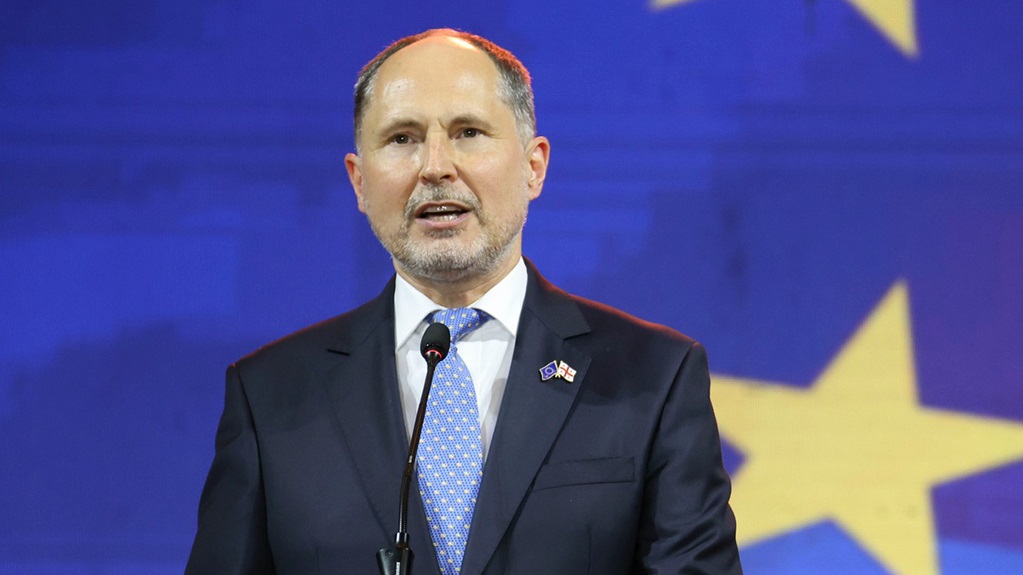"We hope that the elections will be peaceful, free, and fair; however, if the situation deteriorates, we may consider using some of our leverage. None of the possible outcomes can be ruled out, including the temporary suspension of the visa-free regime," EU Ambassador to Georgia Pawel Herczynski stated to the Fair Elections office. The diplomat emphasized that EU countries have consistently voiced their concerns at the highest levels regarding the path Georgia has taken.
News
Trending stories
- 1 Former Prime Minister Garibashvili Sentenced to Five Years in Prison After Plea Deal
- 2 Otar Partskhaladze Charged with Organizing Murder of Businessman Levan Jangveladze
- 3 Shalva Papuashvili Says Georgian Dream Filed Complaint with BBC
- 4 Georgian Dream Party Further Tightens Grants Law, Introducing Up to 6 Years in Prison
"We are deeply concerned that, instead of implementing reforms that would bring Georgia closer to the European Union, recent events have been moving Georgia further away from the EU. We have discussed this within the European Union, and some time ago, we made it clear that all options are on the table, including the temporary suspension of the visa-free regime," said Pawel Herczynski.
He added that when assessing the parliamentary elections on October 26, the European Union will rely on the conclusions of both international and local observers.
"The Georgian authorities have extended an invitation to international observers. We maintain a close relationship with the OSCE/ODIHR team. I know they have significant plans and will be sending a large number of observers before, during, and after the election.
We also support local organizations such as ISFED [Fair Elections], which will also monitor the elections. They will make their assessments, and based on those, we will determine whether the elections were free and fair. I hope it won't come to this, but if the elections are neither free nor fair, we will unfortunately have to use the tools we've applied many times against other countries, including Belarus. We did not recognize the elections in Belarus because they were stolen, which led us to use a wide range of measures, including sanctions. This is the worst-case scenario, and I hope we won't have to reach that point," Herczynski said.
According to the EU Ambassador, if the elections are free, fair, competitive, and most importantly, peaceful, the EU will cooperate with whichever government is formed afterward.
"But the key issue is that if Georgians want to join the European Union, there are conditions. These conditions were not designed specifically for Georgia; they apply to any country that seeks EU membership. That's why serious reforms are needed, and it's crucial that the fundamental principles on which the EU is built are upheld. These principles are well-known:
Democracy, the rule of law, human rights, including minority rights - these principles are not up for negotiation. Therefore, if Georgia wants to join the EU, it must respect these principles," the diplomat emphasized [translation by Mtavari Arkhi].
Politico reported yesterday that the European Union is considering the suspension of visa liberalization as one of the options in response to further democratic backsliding in Georgia. A European Commission spokesperson explained to the publication that under the framework of the EU-Georgia visa liberalization dialogue and the corresponding action plan, Georgia is required to meet specific criteria, including ensuring the protection of fundamental rights and preventing discrimination.
Maka Bochorishvili, Chairman of the European Integration Committee of the Parliament of Georgia, stated that EU countries are divided on the issue of suspending visa-free travel, though speculation persists.
"This clearly shows that some forces are using these issues to influence the election results. They are using it to speak to the Georgian people in a form of blackmail, trying to influence their decisions during the election process. There is no other explanation for these speculations. It's impossible to discuss election violations when the elections are just around the corner," Bochorishvili said.















